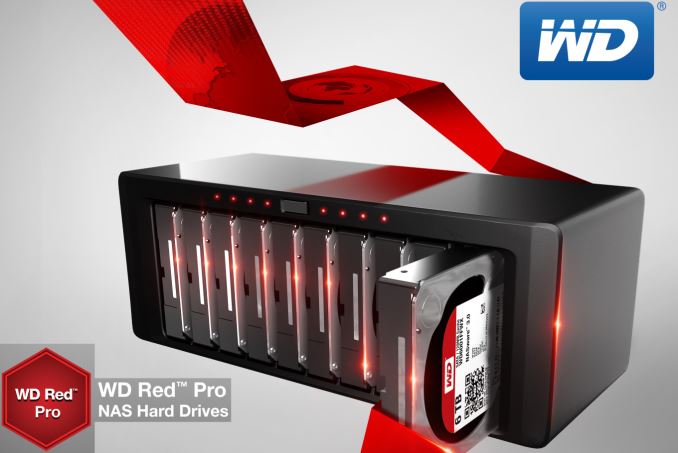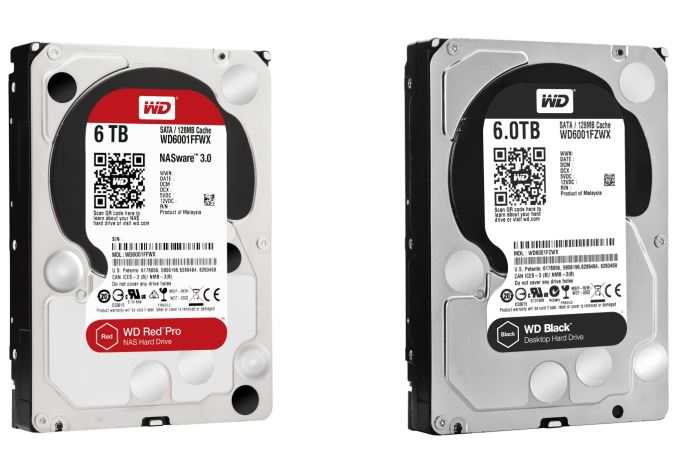Western Digital Updates WD Red Pro and WD Black with 5 & 6TB Models
by Ganesh T S on August 18, 2015 8:00 AM EST- Posted in
- NAS
- Storage
- Western Digital

It is that time of the year when Western Digital updates their Red lineup. Launched in 2012, the WD Red drives target network attached storage units with an optimized set of features for SMB / SOHO NAS units (up to 8 bays). It was initially launched in 1, 2 and 3TB capacities. In 2013, we saw a 4TB variant being added to the lineup along with some 2.5" drives. 2014 saw the addition of a Pro lineup (2,3 and 4TB) intended for use in NAS units with up to 16 bays. A 6TB Red version was also introduced. This year, we get 5 and 6TB WD Red Pro units. In addition, WD is also launching 5 and 6TB WD Black drives targeting gamers and creative professionals with a need for large capacity and high performance.
The important features of the WD Red Pro drives being announced today include:
- 128 MB cache
- Transfer rates up to 214 MBps
- Vibration tolerance and shock protection using a multi-axis shock sensor and dynamic fly-height technology
There doesn't seem to be any updates to the firmware (NASware 3.0, introduced last year, is retained). The Red Pro drives carry a 5 year warranty. The WD Red Pro 5TB version (WD5001FFWX) has a MSRP of $269, while the 6TB version (WD6001FFWX) is priced at $299. In terms of MSRP, this seems to be lower than the Seagate Enterprise NAS HDD by $50.
The WD Black is Western Digital's desktop hard drive lineup with a focus on performance. Similar to the WD Red Pro, the Black lineup is also getting 5 and 6TB members priced at $264 and $294 respectively. These drives also have a 128 MB cache and spin at 7200 RPM (just like the WD Red Pro units). While WD didn't provide hard performance numbers, the press release indicates that the 6TB version is 29% faster than the WD Black 4TB in terms of maximum data throughput, while scoring 10% more in PCMark Vantage. It also comes with a 5-year warranty.











51 Comments
View All Comments
ddriver - Tuesday, August 18, 2015 - link
A single 4 or 6 TB drive will be faster than a single 1 TB drive. But with multiple drives you can read / write to many simultaneously without performance penalty Whereas with a single drive things will slow down significantly in such a scenario, if it is to occur. Even without raid you can get more throughput with multiple drives. Also, there is the reliability factor, with a big drive, a failure will cost you all your data.The smartest thing to do is buy multiple drives with good reliability that have the best price to capacity ratio, currently 2 and 3 TB drives are in the sweet spot. The performance difference will be negligible when it comes to stuff that you would typically put on bulk storage - media such as video, music or images. Even games are IMO not worth it putting on something as fast as SSD - the load time improvement is nowhere near the cost difference.
stephenbrooks - Tuesday, August 18, 2015 - link
Thanks, so if I'm actually working on a single drive (no RAID - others are just nightly backups), then the bigger disk might be faster, but I'll have to compare the specific benchmark numbers with my existing one to see if it's worth doing.I've not gone for RAID yet because it means taking some extra care transferring those HDDs into a new PC (and I certainly can't transfer them individually!) If it weren't for that, I'd go for something like RAID5 (or 10, but not 0), since I still want the redundancy.
rtho782 - Wednesday, August 19, 2015 - link
3x4tb blacks in RAID 0 for my steam directory and other storage here, HDtach gives me sequental reads in the realms of SSD speeds, over 500mbyte/sec.danwat1234 - Thursday, August 20, 2015 - link
Depends on the platter density. You could have a 1TB drive that has one 1TB platter so very possibly no increase versus the 4TB four 1TB platter drive.I've found that doubling of the platter density is maybe 20-30% more throughput, max. You'll need about a 40TB hard drive at 5 platters to equal the throughput of a SATA 3 SSD with quick guessing.
ummduh - Tuesday, August 18, 2015 - link
The pricing actually seems downright reasonable for a change.ricster7227@gmail.com - Wednesday, August 19, 2015 - link
I have gone the no service and error route with WD Red Drives in the past and will be sticking with their obvious replacements HGST Deskstar NAS which I have several at a better price and never had a failure. Yes the 6TB plus filled with the scotch of your choice if that fails!mapesdhs - Wednesday, August 19, 2015 - link
A "creative professional" with even half a clue would use Enterprise SATA or SAS, not a WD Black.And the one Red I bought died really quickly, never buying another.
asmian - Thursday, August 20, 2015 - link
QFT. I've never bought anything but WD RE drives and I have never had a failure. They are just built better. Even a really old RE-GP model is still going strong. I'd never waste money on a non-RE drive. Sure, the "I" in RAID stands for "inexpensive", but I don't want to waste time and ultimately money swapping cheap, failing drives in and out and rebuilding arrays all the time just because the RAID is a safety net for their poorer build quality.And the bigger they are the more likely they are to fail. 1GB to 2GB drives are the sensible reliability sweet spot still, although if I had the cash and really needed massive storage space I'd switch up to the 8GB HGST Helium-filled ones which are proving even better AFAICT from reviews and anacdotes, and are the same price per GB or less as RE drives.
asmian - Thursday, August 20, 2015 - link
GB -> TB. Where's the frickin' Edit button?/rant
danwat1234 - Thursday, August 20, 2015 - link
How many platters, 6? Wonder how much faster it is than Segate's 6TB 7200RPM ST6000DX000 drive if any. But someone on StorageReview said it's 5 platters probably but nobody knows for sure. Could be 5 at 1.2TB/platter like the 6TB Caviar Green. Good throughput then!BTW, the Scorpio Black ,WD's 7200RPM laptop drive, it has been stuck at 750GB for the past 4 years! Come on! At least get to 1TB @ 7200RPM like Hitachi has had for about 2 years.